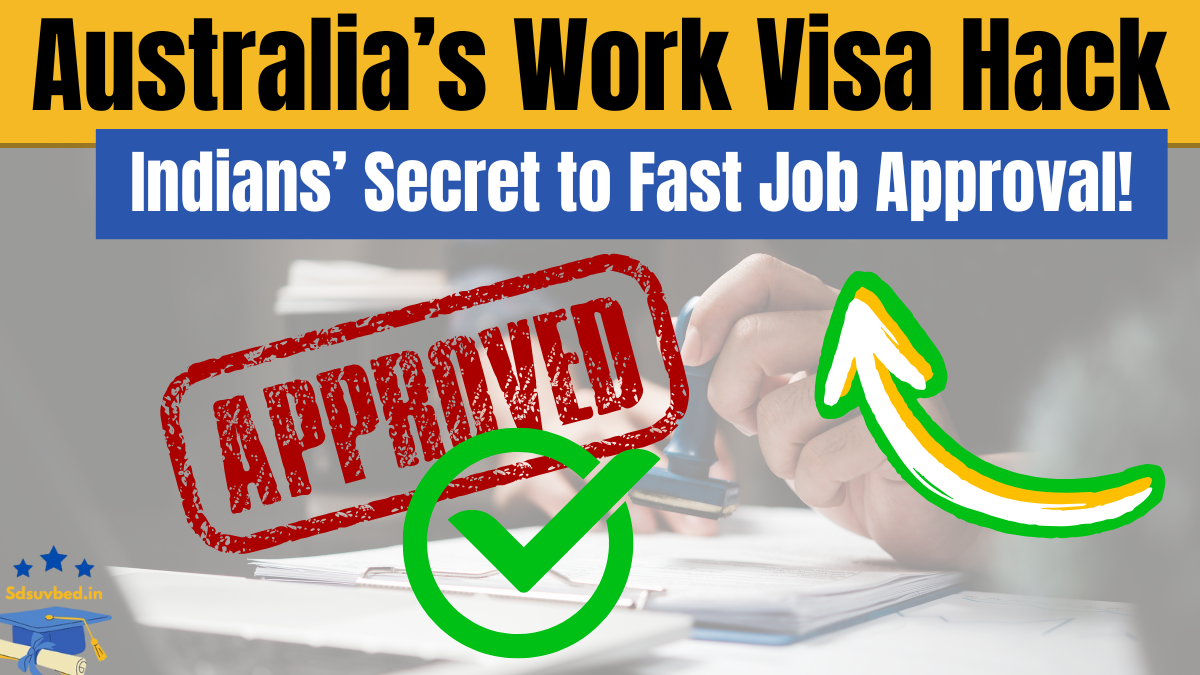Australia continues to be a sought-after destination for Indian professionals seeking international work experience. To legally work in Australia, Indian citizens must obtain an appropriate work visa. This guide outlines the types of work visas available, eligibility criteria, application process, associated fees, and essential documentation required for 2025.

What Types of Australian Work Visas Are Available for Indian Citizens?
Several visa options are available for Indian nationals aiming to work in Australia:
- Temporary Skill Shortage (TSS) Visa (Subclass 482): Allows skilled workers to work in Australia for up to four years, provided they have sponsorship from an approved Australian employer.
- Skilled Independent Visa (Subclass 189): A points-based visa for individuals with in-demand skills, permitting indefinite residence and work in Australia without employer sponsorship.
- Skilled Nominated Visa (Subclass 190): For applicants nominated by an Australian state or territory government, offering permanent residency and work rights.
- Employer Nomination Scheme (ENS) Visa (Subclass 186): Enables Australian employers to sponsor foreign workers for permanent residency.
- Regional Sponsored Migration Scheme (RSMS) Visa (Subclass 187): Targets skilled workers willing to work in regional Australia, providing a pathway to permanent residency.
- Working Holiday Visa (Subclass 417): Available to young adults aged 18 to 30 (or 35 for certain countries), allowing them to work and travel in Australia for up to 12 months.
What Are the Eligibility Requirements for Australian Work Visas?
Eligibility criteria vary depending on the visa subclass but generally include:
- Valid Passport: Must have at least six months’ validity remaining.
- Sponsorship: Required for employer-sponsored visas like the TSS and ENS visas.
- Skills and Qualifications: Relevant to the nominated occupation, often necessitating a positive skills assessment.
- English Language Proficiency: Demonstrated through tests such as IELTS or equivalent.
- Health and Character Assessments: Mandatory medical examinations and police clearances.
- Age Limit: Some visas have age restrictions; for instance, the TSS visa typically requires applicants to be under 45 years old.
- Financial Resources: Proof of sufficient funds to support oneself in Australia.
How Can Indian Citizens Apply for an Australian Work Visa?
The application process involves several steps:
- Select the Appropriate Visa: Choose a visa subclass that aligns with your qualifications and employment intentions.
- Confirm Eligibility: Ensure you meet all specific requirements for the selected visa.
- Secure Employer Sponsorship: If applicable, obtain a job offer from an Australian employer willing to sponsor your visa.
- Gather Necessary Documents: This includes identification, proof of qualifications, employment references, English language test results, and health assessments.
- Submit the Visa Application: Complete and lodge your application through the Australian Department of Home Affairs’ online portal.
- Pay Applicable Fees: Visa fees vary by subclass and are subject to change.
- Await Processing: Processing times differ based on the visa type and individual circumstances.
What Are the Fees for Australian Work Visas in 2025?
Approximate application fees for popular work visas are as follows:
| Visa Type | Application Fee (INR) | Additional Charges |
|---|---|---|
| Temporary Skill Shortage Visa (Subclass 482) | ₹11,500 | Health assessment fees may apply |
| Employer Nomination Scheme Visa (Subclass 186) | ₹49,500 | Health and police clearance fees may apply |
| Regional Sponsored Migration Scheme Visa (Subclass 187) | ₹46,200 | Health and police clearance fees may apply |
Note: Fees are subject to change; consult the official Australian government website for the most current information.
What Documents Are Required for an Australian Work Visa Application?
Applicants typically need to provide:
- Valid Passport: With at least six months’ validity.
- Proof of Sponsorship: Employer nomination or sponsorship letter.
- Skills Assessment: Positive assessment from a relevant Australian authority.
- English Language Test Results: Demonstrating required proficiency levels.
- Health and Character Certificates: Medical examination reports and police clearance certificates.
- Financial Evidence: Bank statements or financial documents proving sufficient funds.
- Additional Documents: As specified for the particular visa subclass.
MUST READ: Student Australia Visa Rejections Are Rising! What Indian Students Must Know Before Applying
FAQs
What is the Temporary Skill Shortage (TSS) Visa?
The TSS visa (Subclass 482) allows skilled workers to work in Australia for up to four years, provided they have sponsorship from an approved Australian employer.
Do I Need Employer Sponsorship for All Work Visas?
No, visas like the Skilled Independent Visa (Subclass 189) do not require employer sponsorship, while others, such as the TSS and ENS visas, do.
What is the Age Limit for Australian Work Visas?
Age limits vary; for instance, the TSS visa generally requires applicants to be under 45 years old, whereas the Working Holiday Visa is for individuals aged 18 to 30 (or 35 for some countries).
How Long Does the Visa Application Process Take?
Processing times differ based on the visa subclass and individual circumstances. It’s advisable to check the latest processing times on the official Australian government website.
Can I Apply for Permanent Residency Through a Work Visa?
Yes, certain work visas, such as the ENS Visa (Subclass 186) and the RSMS Visa (Subclass 187), provide pathways to permanent residency in Australia.
Is Health Insurance Mandatory for Work Visa Applicants?
While not always mandatory, having health insurance is highly recommended to cover any medical expenses during your stay in Australia.
What English Language Tests Are Accepted?
Tests like IELTS, TOEFL, and PTE Academic are commonly accepted to demonstrate English language proficiency.
Can I Include Family Members in My Work Visa Application?
Many work visas allow you to include immediate family members in your application, but it’s essential to verify this for your specific visa subclass.
Please note that visa regulations and requirements are subject to change. It’s crucial to consult the official Australian Department of Home Affairs website or seek professional advice before proceeding with an application.
Click here to know more.
A passionate content writer specializing in creating engaging, SEO-optimized content. With expertise in blogs, web copy, and storytelling, I craft words that connect with audiences and deliver results.
